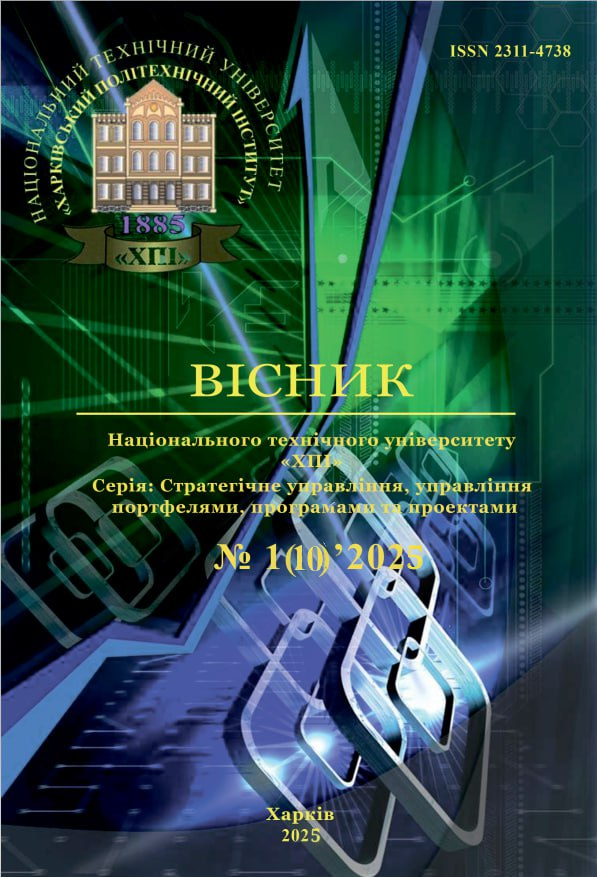STRATEGIC DEVELOPMENT OF EDUCATION PROGRAM UNDER THE INFLUENCE OF AI
DOI:
https://doi.org/10.20998/2413-3000.2025.10.1Keywords:
Strategic development, Artificial Intelligence, Education, Personalized Learning, Adaptive LearningAbstract
The subject of this research is the strategic development of education programs under the influence of Artificial Intelligence (AI). It focuses on exploring how AI technologies can be effectively integrated into educational systems to enhance learning outcomes, improve administrative efficiency, and address contemporary challenges such as accessibility, inclusivity, and ethical concerns. The object of research is the education programs themselves, specifically their structure, delivery, and outcomes, as influenced by the integration of Artificial Intelligence (AI). The rapid evolution of Artificial Intelligence (AI) has profoundly impacted various sectors, including education. This paper examines the strategic development of education programs influenced by AI, exploring how advanced technologies can transform traditional pedagogies, curriculum design, and educational delivery. It identifies key areas where AI contributes to personalized learning, adaptive assessment, and administrative efficiency, offering solutions to challenges such as accessibility and scalability. The study highlights case examples of AI integration into educational systems and provides a framework for policymakers and educators to strategically implement AI-driven tools. Furthermore, ethical considerations, such as data privacy, algorithmic bias, and the role of educators in an AI-enhanced environment, are critically discussed. The findings suggest that leveraging AI in education requires a balanced approach to ensure innovation aligns with equity, inclusivity, and sustainability. This paper aims to guide stakeholders in harnessing AI to create forward-thinking, effective, and ethical educational programs for the 21st century. The research confirms that AI can profoundly transform education programs by enhancing personalization, efficiency, and scalability. However, addressing ethical and infrastructural challenges is essential for equitable and sustainable adoption. The results provide actionable insights for policymakers, educators, and administrators to strategically implement AI-driven solutions in education.
References
Chen, L., Chen, P. and Lin, Z. (2020) ‘Artificial Intelligence in Education: A Review’, IEEE Access, 8, pp. 75264–75278. DOI: 10.1109/ACCESS.2020.2988510.
Luan, H., Géczy, P., Lai, H., Gobert, J., Yang, S., Ogata, H., Baltes, J., Guerra, R., Li, P., & Tsai, C. (2020). Challenges and Future Directions of Big Data and Artificial Intelligence in Education. Frontiers in Psychology, Vol. 11. https://doi.org/10.3389/fpsyg.2020.580820.
Baek, C., & Doleck, T. (2020). A Bibliometric Analysis of the Papers Published in the Journal of Artificial Intelligence in Education from 2015-2019. International Journal of Learning Analytics and Artificial Intelligence in Education, 2, 67. https://doi.org/10.3991/ijai.v2i1.14481.
Zawacki-Richter, O., Marín, V., Bond, M., & Gouverneur, F. (2019). Systematic review of research on artificial intelligence applications in higher education – where are the educators?. International Journal of Educational Technology in Higher Education, 16. https://doi.org/10.1186/s41239-019-0171-0.
Paek, S., & Kim, N. (2021). Analysis of Worldwide Research Trends on the Impact of Artificial Intelligence in Education. Sustainability. https://doi.org/10.3390/SU13147941.
Zhai, X., Chu, X., Chai, C., Jong, M., Istenič, A., Spector, M., Liu, J., Yuan, J., & Li, Y. (2021). A Review of Artificial Intelligence (AI) in Education from 2010 to 2020. Complex., 2021, 8812542:1-8812542:18. https://doi.org/10.1155/2021/8812542.
Jebadurai, D., Dheenadayalan, M., & Chandrasekaran, D. (2023). Relevancy of Artificial Intelligence in Education: A Conceptual Review. Journal of Informatics Education and Research. https://doi.org/10.52783/jier.v3i2.322.
Dogan, M., Dogan, T., & Bozkurt, A. (2023). The Use of Artificial Intelligence (AI) in Online Learning and Distance Education Processes: A Systematic Review of Empirical Studies. Applied Sciences. https://doi.org/10.3390/app13053056.
Yakkala, K. (2024). AI-powered assessment tools for E-learning: Enhancing feedback and grading systems. World Journal of Advanced Engineering Technology and Sciences. https://doi.org/10.30574/wjaets.2024.13.1.0497.
Bushuyev, S. D., & Ivko, A. V. CONSTRUCTION OF MODELS AND APPLICATION OF SYNCRETIC INNOVATION PROJECT MANAGEMENT IN THE ERA OF ARTIFICIAL INTELLIGENCE Eastern-European Journal of Enterprise Technologies 3/3 ( 129 ) 2024 (р. 44–54) DOI: 10.15587/1729-4061.2024.306436.
Downloads
Published
Issue
Section
License

This work is licensed under a Creative Commons Attribution-NonCommercial-ShareAlike 4.0 International License.
Our journal abides by the Creative Commons copyright rights and permissions for open access journals.
Authors who publish with this journal agree to the following terms:
Authors hold the copyright without restrictions and grant the journal right of first publication with the work simultaneously licensed under a Creative Commons Attribution-NonCommercial-ShareAlike 4.0 International License (CC BY-NC-SA 4.0) that allows others to share the work with an acknowledgement of the work's authorship and initial publication in this journal.
Authors are able to enter into separate, additional contractual arrangements for the non-commercial and non-exclusive distribution of the journal's published version of the work (e.g., post it to an institutional repository or publish it in a book), with an acknowledgement of its initial publication in this journal.
Authors are permitted and encouraged to post their published work online (e.g., in institutional repositories or on their website) as it can lead to productive exchanges, as well as earlier and greater citation of published work.

